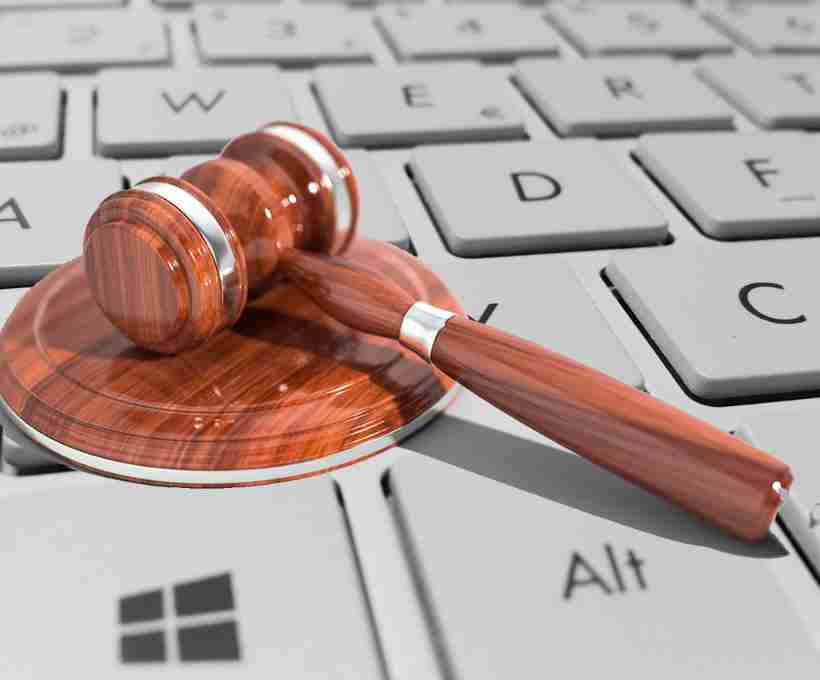Your Friendly Guide to the Legal Side of the Internet Jungle
Imagine this: you wake up one day, check your email, and discover someone tried to reset your bank password. Weird. Then you scroll through social media and see a deepfake video of someone famous doing something they never did. Creepy. You hop on a video call for work—and someone tries to Zoom-bomb your meeting with inappropriate content.
Now imagine a world where nothing could be done about this. No rules. No punishment. Just chaos.
That’s what the internet would be like without cyber law.
Let’s unravel this fascinating—and super important—part of our digital lives.
Chapter 1: The Digital Wild West 🌐
Before we dive into definitions, let’s take a walk through history.
The internet started as this shiny new thing for academics and tech geeks. No rules, just protocols. People emailed, coded, shared files… and then came the dot-com boom. Suddenly, the internet wasn’t just a tool—it was life.
And as with all things people use, misuse followed. Identity theft. Online harassment. Piracy. Hacking.
It was chaos—like the Wild West. Gunslingers with keyboards instead of revolvers. Only difference? You could ruin someone’s life without leaving your bedroom.
That’s where cyber law rode in on a digital horse.
Chapter 2: What Exactly is Cyber Law?
Let’s break it down like you’re five.
Cyber = Related to computers, the internet, and digital networks.
Law = Rules made by governments to keep people in check.
So, Cyber Law is the body of laws that deal with things people do using computers, the internet, and digital systems.
It’s also known as Internet Law or IT Law, depending on where you are.
It covers:
- Crimes committed online
- Online contracts and agreements
- Intellectual property in the digital space
- Privacy rights on the internet
- Cybersecurity obligations
- Regulation of social media, digital banking, crypto, etc.
Basically, it’s the legal system’s way of saying: “Don’t be a jerk online either.”
Chapter 3: Why Do We Even Need Cyber Laws?
Good question. After all, aren’t there already laws against theft, stalking, or defamation?
Yes, but the internet changes everything:
- Speed: A scam can target millions of people across countries within minutes.
- Anonymity: Criminals hide behind fake names, VPNs, and burner accounts.
- Global Reach: A hacker in Ukraine can scam someone in India using a US-based server.
- New Tech, New Crimes: Ever heard of ransomware 50 years ago? Me neither.
Cyber law adapts traditional law to the digital age. It provides frameworks to punish online wrongdoing and protect online rights.
Chapter 4: Types of Issues Cyber Law Covers
Let’s break down what cyber law actually governs. Prepare yourself—this rabbit hole runs deep.
1. Cybercrime
The juicy stuff. Cybercrime includes:
- Hacking: Unauthorized access to systems.
- Phishing: Fake emails/websites to steal data.
- Identity Theft: Using someone else’s personal info.
- Online Fraud: Scam websites, fake investment apps.
- Cyberbullying: Harassment via social media, messages, etc.
- Cyberterrorism: Digital attacks aimed to harm governments or incite panic.
Fun fact: In many countries, sending a threatening emoji repeatedly can count as cyber harassment.
2. Data Protection & Privacy
With every app you install, you’re handing over a chunk of your life.
Cyber laws ensure:
- Companies can’t collect your data without consent.
- You must be told how your data is used.
- You have the right to delete your data (like the “Right to be Forgotten” in the EU).
- Leaks, breaches, or misuses lead to massive fines.
3. Intellectual Property Rights (IPR)
Cyber law protects:
- Online copyrights (e.g., songs, blogs, photos).
- Software patents.
- Trademarks on websites.
- Prevention of online piracy.
This means no, you can’t just copy-paste an image from Google and sell it on your T-shirt store.
4. Digital Contracts & E-Commerce
E-signatures. Online purchase agreements. Website terms & conditions.
Cyber law validates:
- That your online signatures are legit.
- That e-contracts are enforceable.
- That refunds, taxes, and consumer rights apply—even on the internet.
This is why you get that tiny checkbox: “I agree to the Terms & Conditions.” (Even though none of us read it.)
5. Social Media Regulation
Ever posted something and had it taken down? Or reported abuse?
Cyber law comes in here:
- Regulates hate speech, fake news, revenge porn.
- Holds platforms accountable for removing harmful content.
- Lets users report and get justice.
6. Cybersecurity Compliance
Organizations (especially banks, hospitals, schools) are required to:
- Secure your data.
- Report data breaches.
- Implement firewalls and encryption.
- Train employees in cyber hygiene.
Ignoring this? That’s a lawsuit waiting to happen.
Chapter 5: Cyber Law Around the World 🌍
Every country has its version of cyber law. Some are strict. Some… not so much.
United States
- Laws like the Computer Fraud and Abuse Act (CFAA) govern hacking.
- COPPA protects children’s online privacy.
- State laws like California’s CCPA are making waves in data protection.
European Union
- GDPR (General Data Protection Regulation): The gold standard in data privacy.
- Huge fines for violations—even if your company is not based in the EU.
India
- Governed by the Information Technology Act, 2000.
- Covers cybercrime, digital signatures, e-commerce, and more.
- Amendments keep coming to cover social media, online betting, and AI tools.
China
- Very strict internet control (aka the “Great Firewall”).
- Focused on national security and censorship.
Each country tweaks cyber law based on its culture, politics, and tech landscape.
Chapter 6: Careers in Cyber Law 💼
Think it’s just for lawyers? Think again.
You can build a career in cyber law as:
- Cybercrime Investigator
- Digital Forensics Expert
- Data Privacy Consultant
- Corporate Legal Advisor
- Policy Analyst
- Cyber Law Professor
- Ethical Hacker with Legal Training
You can even start as a techie, then specialize in cyber law through certifications or degrees.
Chapter 7: Famous Cyber Law Cases
Let’s spice this up with some real drama.
Case 1: The Love Bug Virus (2000)
A Filipino student created a worm that crashed email servers worldwide. At the time, the Philippines had no law against cybercrime. So… he walked free. That case led to the country drafting its first cybercrime law.
Case 2: Facebook-Cambridge Analytica
A massive data leak scandal. Millions of Facebook users had their personal data harvested for political ads without consent. Result? Facebook paid a $5 billion fine. The world finally woke up to the power of digital surveillance.
Case 3: Aadhaar Privacy Case (India)
Whether collecting biometric data was a privacy violation. India’s Supreme Court ruled that privacy is a fundamental right under the Constitution. Huge win for cyber law.
Chapter 8: The Challenges of Cyber Law
Cyber law sounds perfect—but it’s not without problems.
- Jurisdiction Issues: What if a scammer in Nigeria hacks a company in Canada using a US server?
- Tech Moves Fast: Laws can’t keep up with emerging tech like AI deepfakes, Web3, or quantum encryption.
- Lack of Awareness: Most people don’t even know their digital rights.
- Censorship vs Freedom: Where do we draw the line between safety and freedom of speech?
These are serious debates in courtrooms, governments, and even hacker forums.
Chapter 9: How to Protect Yourself Using Cyber Law
You don’t need to be a lawyer to be smart online.
Here’s how cyber law helps you:
- Report phishing or fraud to national cyber cells.
- File complaints about cyberstalking or harassment.
- Check if apps comply with your country’s data protection laws.
- Demand your data be deleted under the “Right to be Forgotten.”
- If your info gets leaked in a breach—you can sue!
The key is: KNOW YOUR RIGHTS.
Chapter 10: The Future of Cyber Law 🚀
The next decade is going to be wild:
- AI will generate contracts, scams, even court arguments.
- Blockchain will redefine e-commerce and ownership.
- Virtual worlds (Metaverse) will need new laws.
- Cyber war between nations is a rising threat.
We’ll need smarter regulations. Faster courts. Global cooperation.
Cyber law will no longer be optional—it’ll be the foundation of all modern law.
Final Thoughts
The internet is no longer a luxury—it’s life.
We shop, love, learn, protest, and work online.
So we need laws that protect us there too.
That’s what cyber law does.
It’s the invisible shield that stops trolls, hackers, and scammers from taking over the digital world.
It’s the reason you can click a “Report” button and sleep a little easier at night.
And hey, if you ever thought lawyers were boring—just wait till you meet a cyber lawyer who can code, hack, and cross-examine in the same breath.





